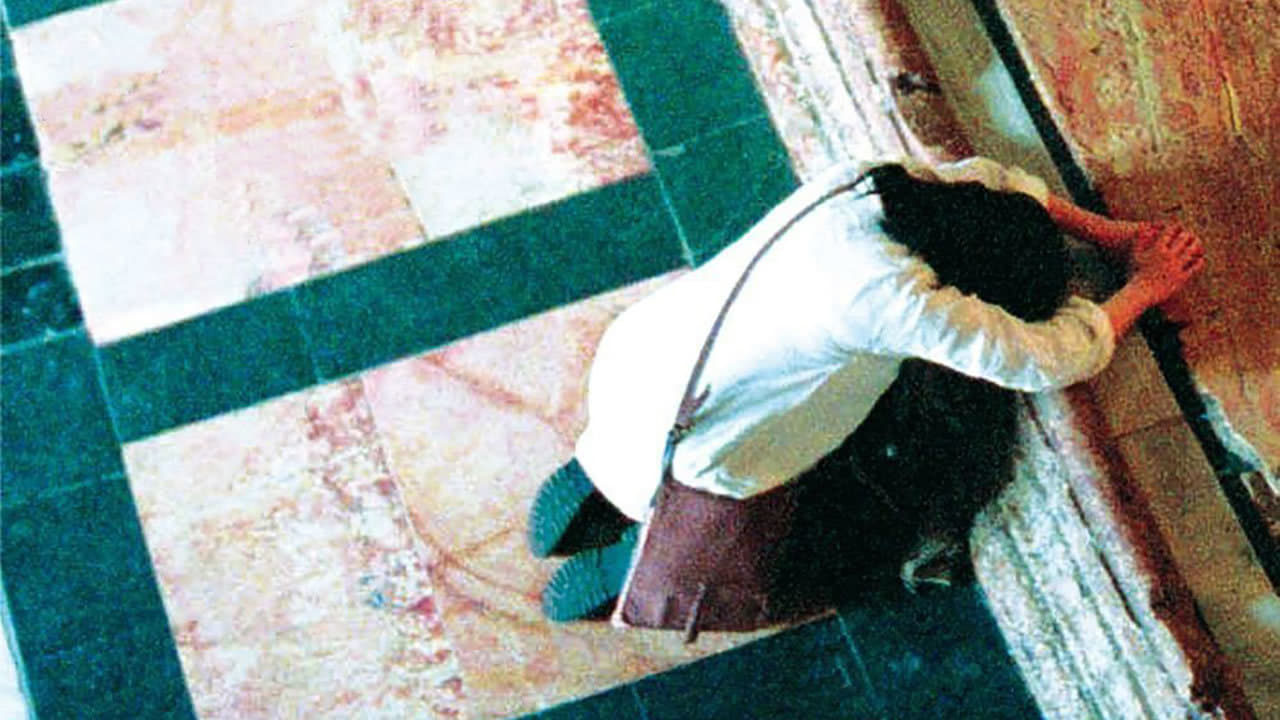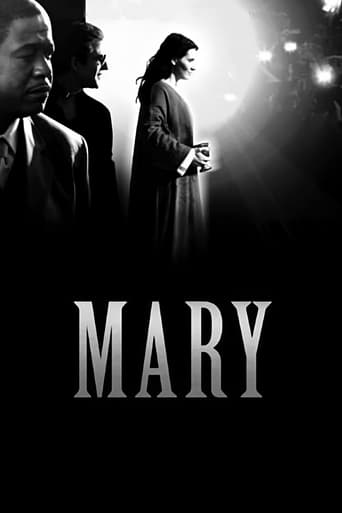

I'll need to start at the end of this film. No spoiler, don't worry. Just me saying, "Huh?" Ferrara's rambling, affected film left me stranded at the end in a Dead Sea. I really wanted to find something to recommend in this film, but all I could think of was how unfocused it was, how miscast, and how dull. One particular problem was Ferrara couldn't decide if he wanted to make an investigative documentary or a inspiring religious drama. On the one side we've got real theologians yammering away about Jesus and Mary, and clips of violence in Palestine. On the other side we have two stories about New Yorkers having spiritual identity crises, and an actress still neurotically lost in her role wandering through the streets of Jerusalem looking for something to eat, or something. In the end we get a murky, arty film with meandering plot lines that don't really go anywhere.In addition we have a casting problem. Juliette Binoche as the ersatz Magdalene plays her role as a treacly, new-agey Christian proselytizer. She reminded me of the people who accost you on buses asking you if you've found Jesus yet.Modine and Whitaker, both plainly uncomfortable playing their roles, end up giving us melodramatic performances that, when arriving at the moment of spiritual catharsis, cause them to start chewing up the scenery. I couldn't help thinking that Whitaker's appeal to God in a hospital chapel made him look like a subject in a Goya painting, but without the pathos that the artist's subjects engenders. Both actors were not able to evince any genuine feelings, which is due mostly to a plot that doesn't allow them to develop their characters in the first place.Better to watch Kazantzakis, or even Gibson. Or see "Cammina, Cammina" by Ermanno Olmi.
... View MoreAfter the conclusion of the shooting of the polemic movie "This Is My Blood" about the life of Jesus performing the role of Maria Magdalene, the successful actress Marie Palesi (Juliette Binoche) feels obsessed by the life of her character and decides to stay in Jerusalem in a quest of faith and self-knowledge to fulfill the emptiness of her life. The selfish and egocentric director Tony Childress (Matthew Modine) returns to New York, where he meets the atheist host of a famous TV show Ted Younger (Forest Whitaker) in the prescreening of his movie. Ted is presenting a series of programs about the life of Jesus Christ and invites Tony to participate as a guest in his show. Meanwhile, Ted has one night stand with Tony's assistant and his upset wife Elizabeth Younger (Heather Graham) has problems with her pregnancy having an early delivery. When the desperate Ted sees the pain of his wife and his premature newborn son, he regrets and feels the need to pray for his beloved family.Abel Ferrara usually uses Catholic icons in his movies; however, "Mary" is specifically about elements of the Catholicism, such as faith, guilty, sin, love and regret. The story is very well acted by Forest Whitaker, Juliette Binoche and Matthew Modine; however, the screenplay is confused and something is missing to make "Mary" a great movie. Nevertheless, it is an original story and does not disappoint. My vote is six.Title (Brazil): "Maria" ("Mary")
... View MoreIt seems like Juliette Binoche is trying to compete with Orson Welles, who received joint third billing in The Third Man in return for about 8 minutes screen time. Here Binoche draws top billing and gets to work about ten or twelve minutes. It's very possible that without her prominent billing this wouldn't draw flies. Sure, the usual suspects, the Festival crowd who like to award prizes to worthless material - check L'Esquive if you don't believe me - have appeared out of the woodwork at Venice but I was part of an audience of eight and most of those I suspect were sheltering from the snow that fell on Paris earlier today. Perhaps it's me but I couldn't detect much of a reason for actually making this. After the hackneyed opening - the rolling of the rock only to discover the body of Jesus is no longer there and a director yelling 'cut' to let us know it's only a film - director/actor Matthew Modine tells Binoche it's time to go back to NY, just like that maybe two minutes after completing the scene, no wrap party, no packing, nothing! only for her to announce she's splitting and leaving for Jerusalem like now, Man. Okay, she's been profoundly affected by perhaps months of filming and immersing herself in the role of Mary Magdalene but we have to take that on trust. After that we get dragged into the story of Forest Whittaker, a celebrity TV interviewer who just happens to be making a series of programmes on Religion and hardly ever gets back to his pregnant wife who, in the real world, instead of yelling at him would be down at the studio because as a celebrity he surely has enough clout to have his wife there. There's lots of talk and I mean TALK, endless, meaningless and in between Binoche wanders around Jerusalem looking cute as Amalie but ultimately this is a tale told by an idiot, full of sound and fury signifying ... nothing.
... View MoreThe latest film by Abel Ferrara, "Mary", was without doubt one of the most eagerly awaited films of this year's Venice Film Festival, where it won the Grand Prix."Mary" will of course be linked to two other big 'relegious' films of the moment: "The Passion of the Christ" and "The Da Vinci Code". However the film stands firmly on its own merit."Mary" can easily be read as "Ferrara's reply to Mel Gibson's "The Passion of the Christ"", a film which made great impact culturally and indeed commercially, like one of the summer blockbusters of 2004 in the United States. However "Mary" does not derogate from the sulfurous tradition which characterizes the films of Abel Ferrara since the beginning, and as such his film is significantly more intellectually provocative than Gibson's film, if slightly less approachable.While giving us a completely revolutionary vision of the character of Mary Magdalene, the director questions the cult of spirituality, while once more questioning his faith with a rare humility. "Mary" takes as it's starting point the now almost mythical Mary Magdalene, disciple of Jesus. The film then evokes three characters bound by her spirit and her mystery... Marie Palesi, an actress, who is playing Magdalene in a film. Tony Childress, a director who is playing Jesus in his own film. Ted Younger, a celebrity journalist, creating a TV show about religious faith. Between fascination and spiritual search, destiny will join these three together. Before Ferrara's "Mary" was even thought of, Juliette Binoche had already been approached to play Mary Magdalene by the historian Jean-Yves Leloup who translated the "Gospels according to Mary Magdalene" and was working on a dramatization. At the time, Binoche declined this offer. Today it is partly thanks to her and Jean-Yves Leloup that "Mary" exists. The historian's dramatization forming the film within a film. Due of this thoughtful and rich background "Mary" does not rest only on one simple "reaction" to the vision of Mel Gibson. The character of Tony Childress (Matthew Modine), director, playboy and megalomaniac seems partly inspired by Mel Gibson but also by Ferrara himself - or his reputation at least. Tony is brilliant in his art but hopelessly poor in life. The message conveyed by "Mary" is subversive in that the film questions the basis of the mystic Judeo-Christian teachings while approaching what can be regarded as one of the more taboo questions of religion, namely the integration of the female into the Divine Word. From this point of view, "The Passion of the Christ" failed and was even symptomatic of the commonly allowed representations of women in religion, namely the worshiping mother, Mary, and the prostitute, Mary Magdalene and the choice to entrust the role of Satan to a woman, while the Word belonged fully to a man - Jesus. On the contrary, Abel Ferrara, who bases his film on the Gospels discovered in 1945 and in particular on the texts credited to Mary Magdalene herself, provides us with another vision of Magdalene as the chief disciple. He thus returns to the female figure the capacity to spread the Word, which women were dispossessed of through the centuries.The film opens with Mary Magdalene (Juliette Binoche) directly after the resurrection. The film is warm and glowing. Then Tony Childress (Matthew Modine) yells cut and the audience is plunged into the reality of the film. After the shoot finishes Childress prepares to return to New York. However his leading actress Marie Palesi (Juliette Binoche) is so affected by her role that she reuses to go with him. Instead she abandons her career and goes to Jerusalem in search of the true Magdalene and resolution for her faith.Back in New York Ted Younger (Forest Whitaker) approaches Childress to appear on his spiritual TV show. Younger's life is a mess, and although his work has lead to his questioning of faith in his personal life he does no such thing. Instead he blatantly cheats on his pregnant wife (Heather Graham). Childress' film "This is My Blood" has caused controversy with the far right and the Jewish lobby. The premiere is threatened with violence. Younger manages to contact Palesi in Jerusalem and creates a telephone confrontation between her and Childress on his show. This confrontation has major implications for all three.The history of Mary Magdalene, such as it is suggested by the extracts of Childress' film, is put at the same level as those of Marie, Ted and Tony. However, it ends up rising above theirs since its message will touch each one of them successively. The director films much in darkness and closed places - cellars, studios, a car or an empty apartment - leading an atmosphere of oppression, supported by a throbbing musical score. At times this darkness is contrasted with beams of illuminating light. Rather than being a trite visual allusion this leads to a revelatory sense of change.The acting is sensational, Juliette Binoche seems literally inhabited by her roles - both as Magdalene and Palesi. She goes from serene to distraught to serene again. Forest Whitaker delivers an upsetting performance and proves once more that he is one of the best actors of his generation. Finally the performance of Matthew Modine is cerebral and emotional work, difficult since he could easily have become a caricature of Gibson or Ferrara."Mary" is successful in the aim to embrace the complexity of the religious faith. Wiser seemingly than usually, Abel Ferrara delivers a fundamentally subversive work. The film conveys a deeply human message with universal vocation which does not require faith in order to be understood or appreciated. In fact the film can be simply be read as a religious horror film - without the devil.
... View More